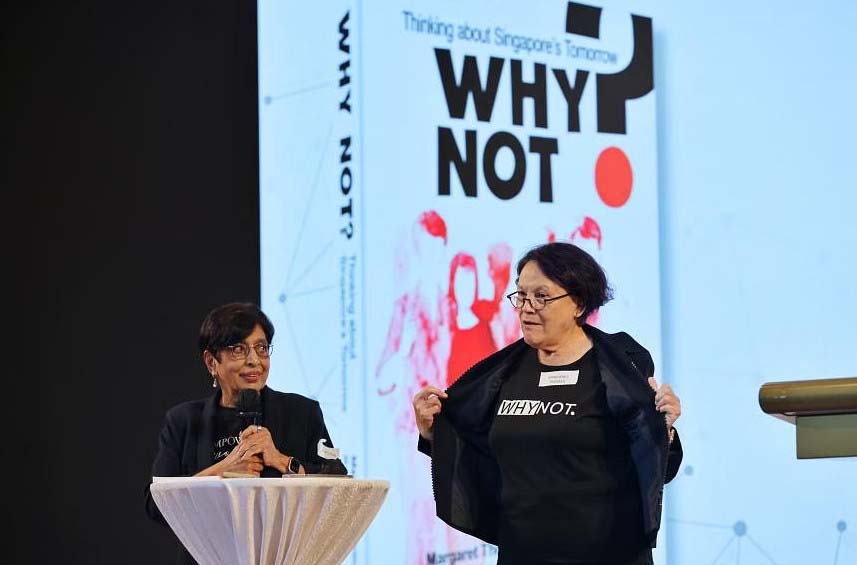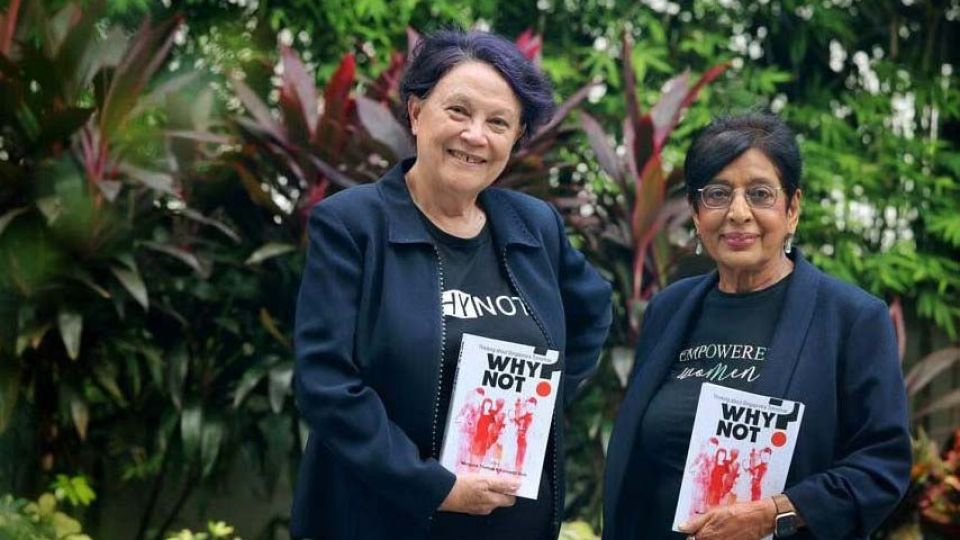June 26, 2024
SINGAPORE – A new book that challenges conventions and questions norms as its writers share their vision of the ideal Singapore has been launched.
Titled Why Not? Thinking About Singapore’s Tomorrow, the 36-chapter, 572-page book has contributions from 45 writers. The 37 female and eight male contributors, aged 15 to 87, include academics, artists, journalists, educators, caregivers, activists, lawyers and doctors.
“We are just a couple of ‘kaypoh’ (nosy) Singaporeans who feel we must speak up, and we must encourage others to speak up,” said former journalist Margaret Thomas, 73, one of the two editors of the book. The other editor is former orthopaedic and hand surgeon Kanwaljit Soin, 82.
“It’s important that the people of a country have a say about where their country is headed and how it’s getting there. Policies need inputs from citizens. Policymaking should not be left entirely to the policymakers.”
Quoting Prime Minister Lawrence Wong’s six-minute video message on June 22, Ms Thomas said she hoped PM Wong would read the book.
In that video, PM Wong had said: “My team and I want to build a society that allows space for U-turns, side-steps, slowdowns, pauses, experimentations, and outliers… Together, we can each write our splendid versions of the Singapore story.”
Dr Soin said that besides gender equality, they are also concerned about other issues, such as violence against women, doing away with race-based self-help organisations, ageism, and migrant workers’ rights and welfare.
Launching the book at the Chui Huay Lim Club in Keng Lee Road on June 25, Singaporean social scientist Noeleen Heyzer, who was the guest of honour, said: “There are many bold ideas in the book, many calls for us – and this means individual citizens as much as the policymakers – to look afresh at policies and processes and open our minds to new approaches to shape the Singapore Dream and turn it into reality.”
She added: “Before we can do this, we must recognise that systems need to be rejuvenated and re-imagined, to be future-ready. We must be ready to listen to alternative, even provocative views, and to engage in robust but reasoned debate and discussion.”
In the book’s foreword, former president Halimah Yacob said she welcomed the diversity of writers and views.
“Some of the ideas and ideals put forth seem controversial, but they represent the perspectives and proposals from the different segments of our diverse society,” Madam Halimah said.
“By listening objectively to the many voices in our society, discussing and debating robustly but rationally our different viewpoints, we deepen our understanding of the challenges and issues facing our society and how to collectively forge our way forward in a volatile and uncertain world,” she added.
On gender equality, Dr Heyzer said mindset shifts are needed if caregiving responsibilities are to be more equally shared between women and men.
“And we know that the best way to bring about these shifts is to change what we teach and demonstrate to children,” she said. “Are we doing this boldly and broadly enough in our kindergartens and schools? If not, why not? And when are we going to start doing it?”

Ex-journalist Margaret Thomas (right) and hand surgeon Kanwaljit Soin, editors of Why Not? Thinking About Singapore’s Tomorrow, at the book launch on June 25. PHOTO: THE STRAITS TIMES
Women also play a key role as health managers, as part of the work they do as the caregivers of their families.
“So, if the very laudable and ambitious Healthier SG plan is to work even better, special attention must be paid to women’s health and better support provided for them in their caregiving role,” she added.
The two editors also raised the issue of ageism in one of the chapters, titled Aged To Imperfection.
Singapore needs to convert its ageing society to an “age-integrated longevity” society, where the old and young can study, work and live together. This will help combat ageism and the demographic challenge of being one of the fastest-ageing countries in the world, they wrote.
“But in Singapore, we have been developing age-separated, rather than age-integrated, spaces,” they added. “For example, why not build senior care centres that are also student care centres?”
Arguably the most ageist policy of all is the retirement age, both said in the book.
“Instead of slowly ratcheting up the retirement and re-employment ages, why not just do away with the notion that chronological age determines our employability and productivity?” they wrote.
The new book follows a 2015 anthology edited by the same two editors, titled Our Lives To Live: Putting A Woman’s Face To Change In Singapore. Both editors were founding members of the Association of Women for Action and Research (Aware) in 1985.
Said Ms Thomas: “For Why Not?, we expanded our circle of writers to include some men whom we felt had good points to make. But we still wanted the contributors to be largely women because there continues to be a need for women’s views and voices to be expressed and heard.”
- Why Not? Thinking About Singapore’s Tomorrow retails for $32 (paperback) and $130 (hardcover) at Kinokuniya, and online at the World Scientific website, Amazon and Lazada. For more information, visit http://www.worldscientific.com/worldscibooks/10.1142/13819


